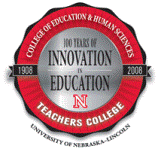Education and Human Sciences, College of

Research and Evaluation in Education, Technology, Art, and Design
ENHANCING PRINT KNOWLEDGE, PHONOLOGICAL AWARENESS, AND ORAL LANGUAGE SKILLS WITH AT-RISK PRESCHOOL CHILDREN IN HEAD START CLASSROOMS
Document Type Article
Abstract
ENHANCING PRINT KNOWLEDGE, PHONOLOGICAL AWARENESS, AND ORAL LANGUAGE SKILLS WITH AT-RISK PRESCHOOL CHILDREN IN HEAD START CLASSROOMS Malinda M. Murphy, Ph.D. University of Nebraska, 2007 Adviser: Guy Trainin This study examined the impact of two language and literacy interventions on the emergent literacy and language skills of 27, four and five-year old children in three Head Start classrooms. Interventions took place three times per week for approximately fifteen minutes over an eight week period. One intervention, WordWork (Calfee, Norman, Trainin, & Wilson, 2001; Calfee & Patrick, 1995) provided explicit instruction in print knowledge and phonological awareness. The second intervention, Dialogic Reading (Whitehurst, Falco et al., 1988), involved interactive storybook reading designed to provide opportunities to enhance language and vocabulary development with young children. The control group received no intervention beyond the curriculum, Creative Curriculum® (Dodge, Colker, Heroman, & Bickart, 2002), offered in the classroom. After an eight-week intervention, children in the WordWork group performed significantly higher on measures of print knowledge and phonological awareness skills than children in both the Dialogic Reading group and the control group. The children in the WordWork group performed significantly higher than students in the control group in oral language ability. The substantial gains in performance made by the children in the WordWork group are attributed to the developmentally appropriate nature of the explicit instruction provided in the program combined with the social constructivist nature of the lessons. Implications for classroom practice are offered, as well as directions for future research.

